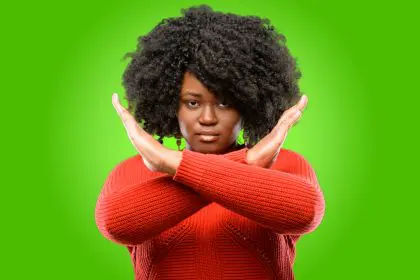In the realm of love and relationships, the landscape is as diverse as the people who inhabit it. Within this spectrum exists a community that has garnered attention in recent years: the divester community. Some dismiss this community as the Black female equivalent of passport bros. However, this article will look at the community with more nuance as we delve into the subset of Black women who have chosen to abstain from dating Black men. This choice, often a result of personal experiences and societal influences, highlights a complex interplay of identity, empowerment, and autonomy.
What is a “divester”?
It’s not far from the original business definition. In this case, it is someone who is “ridding oneself of something that one no longer wants or requires” — namely a Black woman who is ridding herself of the idea of dating or marrying Black men. More specifically, the idea encapsulates the essence of divestment from relationships with Black men while emphasizing solidarity among Black women. It’s essential to approach this topic with sensitivity, acknowledging that individual experiences within the divester community vary widely. However, overarching themes emerge when examining the reasons behind this choice.
Why do some Black women divest?
Historical context
Historical context provides a backdrop for understanding the complexities of relationships between Black women and men. Centuries of systemic oppression, including slavery, segregation, and ongoing racial injustice, have shaped intergender dynamics within the Black community. For some Black women, experiences of mistreatment or marginalization within relationships with Black men may influence their decision to explore alternatives.
The media
Furthermore, media portrayals and societal stereotypes often perpetuate harmful narratives about Black masculinity, femininity, and beauty standards. These depictions can create unrealistic expectations and contribute to internalized biases, impacting how Black individuals perceive themselves and each other. The divester community, in part, challenges these norms by reclaiming agency over their dating preferences.
Social and cultural factors
Additionally, other aspects play a crucial role in understanding the diversity of experiences within the divester community. Factors such as socioeconomic status and cultural background intersect with race and gender, shaping individuals’ perspectives and choices. While the focus here is on Black women who opt not to date Black men, it’s essential to recognize that this decision is not universal among all Black women, nor does it define their identities.
Self-determination in dating, romance and marriage
Empowerment lies at the core of the divester movement, as women assert their right to self-determination in matters of love and romance. By rejecting societal expectations and forging their paths, divesters challenge the notion that romantic fulfillment must conform to predefined norms. Instead, they prioritize authenticity, mutual respect, and emotional well-being in their relationships, irrespective of race or ethnicity.
Critiques and responses of the divester community
Critics of the divester community may misconstrue its message as divisive or anti-Black. However, it’s crucial to understand that the movement’s aim is not to denigrate Black men but to center Black women’s voices and experiences. In advocating for autonomy in dating, divesters seek to dismantle oppressive structures that constrain their agency and perpetuate harmful dynamics.
Moreover, the divester community fosters solidarity and support among its members, creating spaces for dialogue, healing, and personal growth. Through shared experiences and mutual understanding, women within this community find validation and empowerment in their choices, reaffirming the importance of sisterhood in navigating complex social landscapes.
Divesting as a Dating Option for Black Women
The divester community embodies a powerful testament to self-determination and empowerment among Black women who choose not to date Black men. By divesting from these prescribed narratives, these women are not only challenging entrenched stereotypes but are also forging new pathways for personal autonomy and emotional fulfillment. Through their example, these women inspire others to embrace their strength and redefine the essence of love on their own terms.
This story was created using AI technology.

















